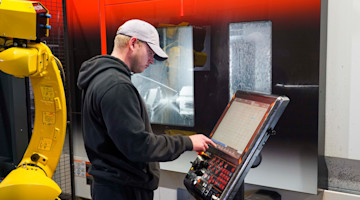The National Institute of Standards and Technology’s (NIST) Manufacturing Extension Program (MEP) announced awards of roughly $400,000 to each of its MEP National Network
The CHIPS and Science Act authorized a pilot program of awards allowing MEP centers to provide services focused on the resiliency of domestic supply chains, workforce development, and adoption of advanced technology upgrades at small and medium-sized manufacturers.
The new awards will support the creation of a database called the National Supply Chain Optimization and Intelligence Network (SCOIN). It will focus on providing supplier scouting services, establishing new service offerings to improve existing supply chain networks, filling gaps in the supply chain by connecting original equipment manufacturers with small and medium-sized manufacturers, and creating a complete map of U.S. supplier capability and capacity.
The MEP funding opportunity requires each center to dedicate at least one staff member or contractor to support these efforts and report on the results to small and medium-sized manufacturers and the MEP National Network. The projects will run for an initial two years and, if successful, may be extended.
The MEP program is a public-private partnership that supports the competitiveness of U.S.-based manufacturing by making manufacturing technologies, processes, and services more accessible to small and medium-sized manufacturers through its MEP Centers. A recent NIST survey of its manufacturing clients found that for every dollar of federal investment in FY 2021, the MEP National Network generated $26.20 in new sales growth and $34.50 in new client investment. This translates into $14.4 billion in new and retained sales for U.S. manufacturers. The network also created or retained one manufacturing job for every $1,193 of federal investment.
AMT supports NIST’s efforts to strengthen manufacturing through the MEP program. To find out more about MEP and to locate your closest center, visit: www.nist.gov/mep. To read more from AMT and IMTS on supply chain resiliency and disruption, go to www.IMTS.com and search for “supply chain.”






